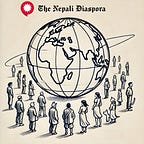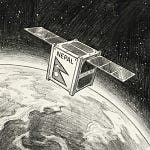Like this newsletter? Support us — making these ain’t easy :)
Forward it to a friend who cares about Nepal and wants to stay sharp. Subscribe for curated, can't-miss updates every week.
As Kathmandu breathes easier after a much-needed downpour (and shoppers side-eye their veggies post-pesticide scare), the political mood stays heavy—with courts still untangling the fallout from March’s fiery protests. Meanwhile, the government’s getting creative to plug its budget gaps, dabbling in everything from crowdfunding to remittance bonds. Let’s dive in.
Economy & Development 💸
As Nepal grapples with a persistent financing crunch for development projects, the government is turning to innovative methods to bridge the funding gap. It recently approved a draft bill to establish the Alternative Development Finance Fund, aimed at unlocking capital through venture financing, mutual funds, remittance bonds, and even crowdfunding. The proposed fund—expected to mobilize around Rs 400 billion annually—would tap into reserves from social security, insurance pools, and the private sector, with the government retaining a 51% stake. According to Republica, Finance Minister Bishnu Prasad Paudel said the fund would catalyze investment in key sectors like energy, infrastructure, and digital services. It's a bold move in a climate where only 55% of the annual revenue target has been met, and contractors remain wary of taking on new projects without secured backing.
Meanwhile, Nepal Rastra Bank (NRB) has been busy stabilizing liquidity, mopping up Rs 195 billion from commercial banks in just three weeks as credit demand wanes amid economic slowdown. At the same time, the NRB reports that consumer inflation has cooled to 3.75%, giving some relief to households after months of soaring prices. Interestingly, the lull in fixed deposit interest rates has redirected public interest toward life insurance products, which saw a more than twofold jump in premiums for deposit-linked policies. As noted by Republica, these shifts signal not just cautious spending but evolving personal finance behavior in a time of macroeconomic uncertainty.
Broader development challenges remain pressing. After nearly half a century, the government is finally moving to update its land acquisition law, with a new bill in Parliament aimed at streamlining compensation and aligning acquisition processes with environmental and social standards — a move long demanded by project-affected communities and developers alike, according to Republica. At the same time, delays in the East-West Railway project have left thousands of landowners in limbo—unable to farm, sell, or develop their property since 2020. On the industrial side, illegal scrap exports to India are starving local manufacturers of raw materials, while new cooperative regulations are tightening savings disclosures and investment limits. Yet there are bright spots: Nepal’s electric vehicle adoption is surging, and in a rare state win, Nepal Oil Corporation closed the fiscal year with a solid Rs 9.55 billion profit.
Social & Cultural ⭐
Vegetable shopping in Kathmandu just got a little more nerve-wracking. Government lab tests have revealed hazardous levels of pesticides in commonly sold produce, including long beans and leafy greens, raising serious health concerns. According to KTM Post, some samples contained organophosphate pesticide concentrations exceeding 90%, with experts warning of risks ranging from kidney failure to neurological damage. As a precaution, officials suggest soaking vegetables in salt or vinegar water and refrigerating them before use. Stepping up its food safety game, the Kathmandu Metropolitan City (KMC) has deployed a mobile lab to test over two dozen products—from hospital canteen meals to fresh produce—on-site. Republica reports that the lab is equipped with tools to detect pesticide residues, milk adulteration, and more, offering near-instant results in the field.
Meanwhile, if the earlier downpour mentioned earlier sounded like a lifeline for farmers, it brought a much-needed breath of fresh air to Kathmandu too—quite literally. The same rain that helped douse forest fires also swept away layers of dust and smoke, giving the Valley a rare break from its chronic pollution. Just a day after being ranked the world’s most polluted city, Kathmandu’s air quality improved dramatically, dropping to the 15th spot with an AQI of 94. Republica reports that residents can now breathe a little easier, with health experts expecting a dip in respiratory complaints and allergy cases.
On the cultural front, things are heating up in all the right ways. Ten finalists are ready to dazzle at the Designer of the Year (DOTY) 2025 finale, hosted by The Hidden Treasure in Kathmandu. With capsule collections, mentorships, and a runway slot at stake, the event is being billed as a major step forward for Nepal’s fashion scene, as covered by KTM Post. And if you're looking for a weekend escape, Nagarkot Visit Year 2082 kicks off this New Year, with four municipalities teaming up to welcome over a million domestic and international visitors. Nepal News reports that the initiative includes homestays, cultural showcases, and plenty of local flavors—all perched on the scenic ridge overlooking the Himalayas. Culture and clean air? We’ll take both, thanks.
Politics & Governance 🪧
Weeks after the Tinkune protest chaos, the political and legal fallout is still unfolding. The political ripples from the March 28 pro-monarchy protest in Tinkune continue to deepen. Businessman-turned-activist Durga Prasai has been remanded to 12 days in custody by the Kathmandu District Court as police investigate charges including sedition, arson, and attempted murder stemming from the violent rally he spearheaded (Kathmandu Post). The protest left two dead, 129 injured, and over 40 buildings and 69 vehicles damaged. The event has also pulled in political figures like Rastriya Prajatantra Party’s Rabindra Mishra and Dhawal Shamsher Rana, who remain in custody. Despite opposition calls, ruling parties have resisted demands for a judicial probe, leaving Parliament’s Law, Justice, and Human Rights Committee deadlocked on next steps (Republica).
Institutional inertia was on display elsewhere, too, as the government failed to appoint a new governor for Nepal Rastra Bank, leaving the central bank rudderless amid persistent economic uncertainty. Outgoing governor Maha Prasad Adhikari’s five-year term ended April 6, but political wrangling has stalled the process of naming a successor (Republica). Meanwhile, at the local level, Kathmandu Metropolitan City has been making good on its threat to crack down on polluting vehicles—detaining over 20 diesel and petrol vehicles overnight for exceeding emission limits. Nearly two-thirds of diesel vehicles tested by KMC failed emissions checks, some despite having just been issued government green stickers (KTM Post).
And in a digital-age twist, the government has issued an ultimatum to tech giants: register in Nepal or risk being banned. Facebook, X (formerly Twitter), and YouTube have until mid-April to comply or face a possible blackout, said Communication Minister Prithivi Subba Gurung, citing concerns over unregulated content, scams, and tax avoidance. So far, platforms like TikTok and Viber have registered, but Meta and others remain silent. The warning comes as Nepal’s Cyber Bureau reports a spike in phishing scams, often masked as loan offers or stock market advice (Republica).
Did you know ❓
Nepal is home to the deepest gorge on Earth—though few Nepalis know it by name. The Kali Gandaki Gorge, slicing through the Himalayas between Annapurna I (8,091 m) and Dhaulagiri (8,167 m), plunges to an estimated depth of 5,571 meters from summit to riverbed—making it deeper than the Grand Canyon by vertical drop. Formed by the Kali Gandaki River, a waterway sacred in both Hindu and Buddhist traditions, this gorge has long served as a crucial trade route between the Tibetan Plateau and the plains of India. Yet despite its geological and cultural importance, it often flies under the radar, even for those who call Nepal home. Read more on Wikipedia
Diaspora & Globalization 🌎
Thousands of immigrants in the U.S., including many Nepalis, are facing bureaucratic erasure under a controversial policy move by the Trump administration. Over 6,000 living immigrants have reportedly been classified as “deceased,” resulting in the cancellation of their Social Security numbers and a loss of access to work, benefits, and basic financial services (Republica). The decision is part of a broader effort to pressure individuals who entered the country under Biden-era programs—such as the CBP One parole scheme—to “self-deport.” Civil liberties groups are expected to challenge the legality of the move, raising alarms about the misuse of administrative tools to sidestep judicial process.
In Southeast Asia, Nepal has shown solidarity with its diaspora and regional partners through a robust humanitarian response to Myanmar’s devastating earthquake. The government handed over 27 tons of relief materials this week, including essential supplies and medicines, while a 16-member Nepali Army medical team returned home after providing life-saving care to nearly 1,300 quake survivors in Mandalay’s Yamethin city (Rising Nepal, Republica). Nepali Ambassador Harish Chandra Ghimire confirmed that at least 18 Nepali workers were killed and several remain missing, while community shelters and support from local organizations continue to aid affected Nepalis in the region. The mission also served as a poignant gesture of reciprocity, echoing Myanmar’s assistance to Nepal following the 2015 Gorkha earthquake.
Let’s connect
Enjoying this issue? 📩 Share it with a friend & let’s keep Nepalis worldwide in the loop! Got thoughts? Hit reply—we’re all ears! Or let us know what you think via our Feedback form or follow us on Facebook | LinkedIn
P.S. Got a story or issue you'd like us to cover next week? Drop us a reply — we're building this space together.
About Nepali Diaspora Digest:
The Nepali Diaspora Digest connects the global Nepali community with curated news, insights, and stories that matter most. Join us as we celebrate and explore the diverse voices and achievements of Nepalis worldwide.
Partner shout out
belayat.uk: helping Nepalis connect in the UK on jobs, housing, events and finding local Nepali owned businesses















